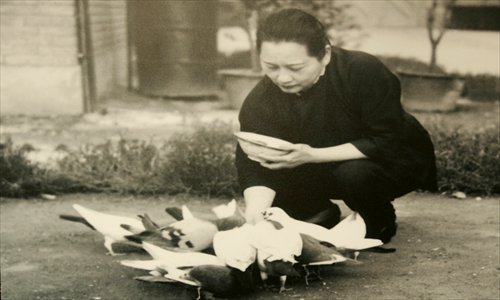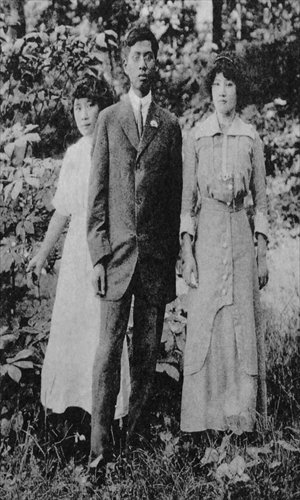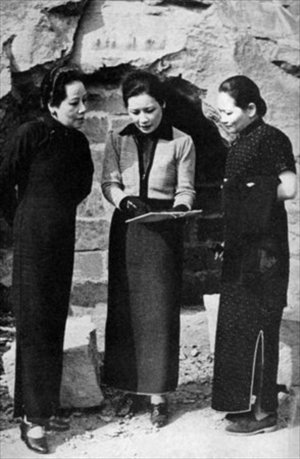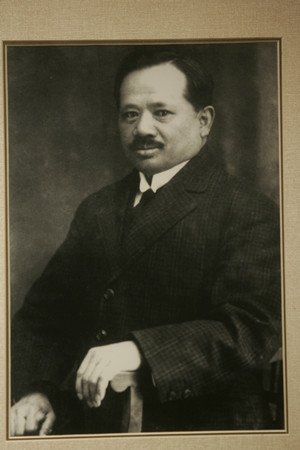HOME >> METRO SHANGHAI
The sisters that shook Shanghai
By Yang Zhenqi Source:Global Times Published: 2013-7-25 17:23:01

Soong Ching Ling feeds pigeons. Photo: CFP
"Once upon a time in distant China, there were three sisters. One loved money, one loved power, and one loved her country." So opens The Soong Sisters, a 1997 film directed by Hong Kong filmmaker Mabel Cheung and starring Maggie Cheung, Michelle Yeoh, Vivian Wu and Jiang Wen.The star-studded melodrama chronicles the lives of three daughters from one of the country's wealthiest and most influential families during the Republic of China (ROC) period (1912-49). Soong Ai-ling, the eldest daughter of the family married H. H. Kung (Kong Xiangxi), a rich Chinese industrialist and a powerful politician in the early 20th century.
The other two Soong sisters also married major figures in 20th-century Chinese history. Soong Ching Ling married Sun Yat-sen, the forerunner of the democratic revolution of modern China and the founder of the Republic of China. Her younger sister Soong Mei-ling married Chiang Kai-shek, the Kuomintang leader.
Prominent in politics
However, the Soong sisters weren't the only stars in a family which had a special talent for acquiring fame and influence. T. V. Soong, the first male born to the family, was a prominent businessman and politician during the ROC period. He established the Central Bank of China and acted as the minister of finance for the Kuomintang government in the late 1920s and minister of foreign affairs in the early 1940s.
The family's progenitor, Charlie Soong, was born Han Jiaozhun in Wenchang, a port on the eastern coast of Hainan Island in 1863. At a young age, he was sent to the US for education and was later trained as a missionary. After eight years abroad, Charlie returned to China to spread Christianity among his fellow Chinese.
However, after arriving in Shanghai in 1886, Charlie sadly found that he was unable to put his religious zeal into practice - his fellow missionaries didn't like him because he was Chinese and the Chinese he was trying to convert didn't like his religion.
Charlie gradually abandoned religion for business. He started his very first business in Shanghai in 1890 - a small publishing house which printed inexpensive bibles in colloquial Chinese. He made an instant fortune from the sales of his bibles.
With the help of Julian Carr, a rich American patron, Charlie soon became a wealthy, influential industrialist in Shanghai, involved in several businesses including food, textiles and importing.
As Charlie built a business empire in Shanghai, he also started a family here with his wife Ni Kwei-tseng, a descendant of Xu Guangqi, the famous scientist and scholar of the Ming Dynasty (1368-1644). The couple married in 1887 and had their first child in 1889 - a girl they named Soong Ai-ling.
Their next daughter, Ching Ling was born in 1893, followed by their first son T. V. Soong a year later. Their last daughter, Mei-ling came in 1897 followed by the brothers T. L. Soong and T. A. Soong.

An old family photo of Soong Mei-ling, T. V. Soong and Soong Ching Ling from left to right. Photo: CFP
A new homeWith his newfound wealth, Charlie built the family's first residence in Shanghai on East Yuheng Road (today's Dongyuhang Road in Hongkou district). It was a two-story building in an East-meets-West architectural style.
Surrounded by gardens and lawns, the house had a library, a dining room and two parlors on the ground floor. There were four bedrooms and two bathrooms on the second floor. The building boasted some of the most up-to-date features of any home in the city at the time - taps, tubs and heaters.
In addition to the kitchen, garage and servants' rooms behind the main building, there was also a large garden inside the Soong's enclave where Charlie grew vegetables as a hobby. The family lived in the Hongkou house for about 20 years before they moved to a new residence in the city's former French concession. The home and surrounding buildings have become restaurants, bars and Shanghai Conservatory of Music buildings in and around today's Dongping Road.
Given his own overseas schooling, Charlie wanted all of his children to be educated in the US. His oldest daughter Ai-ling was the first to go abroad at 13 after studying at an English-language school in Shanghai.
She became a student at the Wesleyan College, a leading liberal arts women's college in Macon, Georgia. The other sisters followed her there a few years later.
After graduating from Wesleyan in 1909, Ai-ling moved back to China and worked as Sun Yat-sen's secretary on her father's recommendation. She was mostly responsible for handling Sun's correspondence and decoding messages to him from fellow revolutionaries.
Sun was a close friend of Charlie and shared his progressive views. The two men met at a Sunday service at a church in Shanghai in 1894 and became close friends, sharing a Western education, birth place, religion, and most importantly, burning ambitions and a craving for change in China.
Soon Charlie started funding Sun's political campaigns and overseas trips to find financial backing and support. He was also a key player in the events that eventually led to the Revolution of 1911 that overthrew the Qing Dynasty (1644-1911) and paved the way for the founding of the Republic of China.

The three Soong sisters gather together. Photo: CFP
A bitter end
Their decade-long friendship came to a sudden and bitter end with the love affair between Sun Yat-sen and Soong Ching Ling. By then Ai-ling had then married H. H. Kung and could no longer handle the work as Sun's secretary. Her younger sister Ching Ling took the job in 1914.
She fell deeply in love with Sun sharing his progressive ideals but they kept their love secret for a time. When Charlie discovered they were in love, he was furious - Sun was already married and he was more than twice Ching Ling's age.
Ching Ling defied her father and ran off to Japan to elope with Sun. The couple walked down the aisle on October 25, 1915, even though the young girl's parents vehemently opposed the match. Charlie cut all ties with his former friend.
Charlie Soong died of kidney disease on May 3, 1918, in Shanghai, aged 54. Sun Yat-sen died of liver cancer on March 12, 1925, in Beijing. The passing of these two remarkable men saw a new series of upheavals in their beloved China.
After Sun's death, Ching Ling continued to play an active role in domestic politics - the Kuomintang split into factions with a power struggle between Sun's young follower Chiang Kai-shek and his old revolutionary comrade Wang Jingwei. In a bid to reclaim Sun's political legacy, Chiang was to marry Ching Ling's younger sister Mei-ling to become Sun's brother-in-law.
Soong Mei-ling met Chiang in 1920. He was 10 years older than her and was married. Given his marital status and that he was a Buddhist, Mei-ling's mother fiercely opposed their relationship. But after Chiang promised to divorce his then wife and convert to Christianity, she finally approved their match. The couple married in Shanghai in 1927.
Mei-ling introduced Chiang to Western culture and ideas, and with her influence and connections helped him promote his cause abroad and win financial backing. By the time they married, Chiang had already taken control of the Kuomintang and began to expel the country's Communist members, a move that Ching Ling greatly deplored as she believed it betrayed the ideals of her husband. The move also marked the start of China's civil war between 1927 and 1937, a time when the two Soong sisters had no contact with each other.
After the outbreak of the War of Resistance against Japanese Aggression in 1937, Ching Ling set up an organization to bring medical and child welfare aid to the Communist-controlled areas of the country. The period also saw a temporary reunion of the three children of the family, Ching Ling, Mei-ling and T. V. Soong in their war-ravaged home country.
After the defeat of the Japanese in the mid-1940s, civil war broke out again in China as the Communists and the Kuomintang fought to control the country. The Soong family was split again and the power of the family began to falter. Soong Ai-ling and T. V. Soong moved their family to the US, prior to the founding of the People's Republic of China in 1949.
As the Kuomintang forces were defeated in 1949, Soong Mei-ling flew with her husband to Taiwan where Chiang established his regime. Still influential, Mei-ling continued to seek support and help from the West for her husband's government. After Chiang's death in 1975, she moved to New York where she lived in semi-seclusion until she died in 2003, aged 106.

Charlie Soong, the father of the famous Soong sisters. Photo: CFP
Highly respected
Soong Ching Ling remained on the Chinese mainland supporting the Communist Party of China. A highly respected figure, she devoted the rest of her life to women's and children's welfare. She was given the title of Honorary President of the People's Republic of China before she passed away in 1981, in Beijing, at the age of 88.
Her home in Shanghai was opened to the public in 1988. Located at No.1843 Huaihai Road Middle, the Soong Ching Ling Memorial Residence in Shanghai features a museum and the house where she had lived since the establishment of new China in 1949.
The three-story home built in the early 1920s remains in almost precisely the same condition it was during Ching Ling's lifetime, to give visitors an insight into her life. And the museum displays a wide array of mementos including pictures, books, greeting cards, letters and personal items.
Posted in: Metro Shanghai, Meeting up with old Shanghai